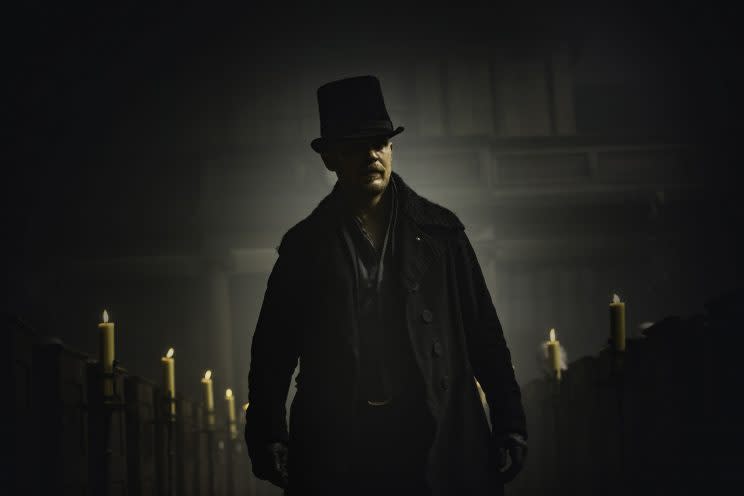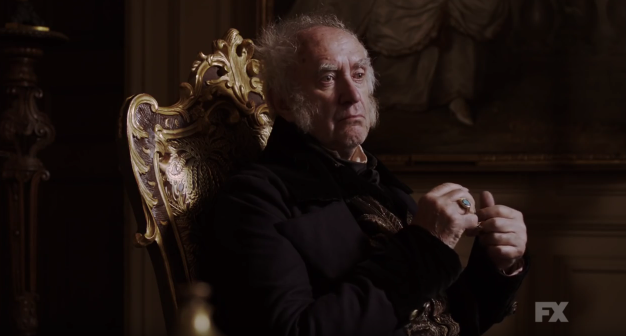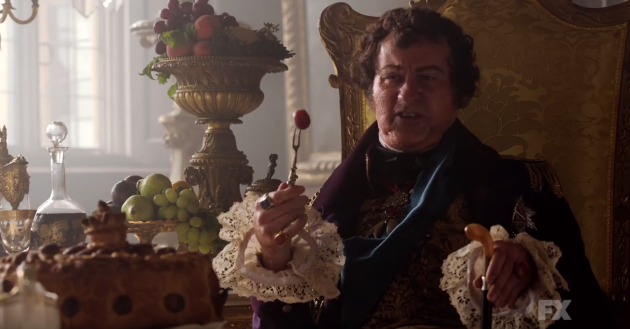‘Taboo’ Co-creator Steven Knight Previews Tom Hardy’s New FX Drama and a Break From Convention

Years ago, Steven Knight was invited to meet Tom Hardy and discuss Hardy’s idea for a television project about an adventurer returning from Africa. “I was in the process of writing [the 2013 film] Locke,” Knight remembers. “We sort of did a deal where he would do Locke if I did this, and that was the trade-off.”
Hardy has finally collected. On Jan. 10, Taboo — a BBC co-production co-created by Hardy, Hardy’s father, Chips, and Knight (Peaky Blinders) — premieres on FX. Tom stars as James Keziah Delaney, who returns to London in 1814 after 10 years in Africa to claim his inheritance — namely a piece of real estate that puts him in the crosshairs of the power-jockeying trade giant East India Company (with whom he has a dark history), the British Crown, and America. “It’s basically one man establishing his individuality against the biggest forces in the world,” says Wright.
Here, he offers us a preview.
Related: Winter TV Preview: The Scoop on 29 New Shows
Yahoo TV: What fascinated you about this time period?
Steven Knight: The original idea was set in a different time period. I really wanted to set something in London in 1813, 1814, which has always been a time of interest for me because I think there was so much going on in the world, in the U.S., in Britain, in France. In that year, the East India Company had their monopoly taken away by the British crown, so not only did you have conflict between the crown and the biggest multinational conglomerate the world has ever seen, you also had all of these international conflicts as well. What I wanted to do was take a character and throw him into that madness that was going on at the time. It was like an explosion that was just continuing to happen. That’s why I felt that if you’re going to have an adventurer return from Africa, this is the London they should come back to.
There is a kind of mystical element to the show that will be slowly revealed. Tom’s character sees flashes of things, which are hinted at in the trailer. What inspired that?
Tom and I have an interest in knocking the thing off the rails a little bit. Do you know what I mean? It’s like seeing something from the inside of the character so that in a way, the audience is getting the characters’ reality as well as the real reality around them. So you do often see things through the point of view of the hero, and that hero is a hugely flawed hero, and also one who has been through many traumatic experiences and has also been to Africa and learned things about other ways of perceiving reality.
It’s not Heart of Darkness, where a European goes and witnesses horrors. It’s the opposite. It’s where a European who left London very troubled, very harmed, goes to Africa and is healed in a way, but comes back and brings some of that wisdom back with him, which we wanted to realize and execute in a particular way so that you do see the world through that person’s eyes. So his reality is on very shaky ground. All will be revealed, but in a way that I think you’re probably not expecting. Let’s just say that.
What did Tom love about this character?
He doesn’t ever want to do the expected, so we wanted to create a very particular protagonist who has his own view of what’s right and what’s wrong. In the eight hours of the series, we will see that he does have a particular morality. He’s a good man doing bad things for a good reason. That’s the sort of character Tom and I like to explore: There’s not many things you can empathize with [at the start], but over time, you understand that character, and when that character finally does the stuff that you want him to do, it’s a great big cheer from the audience.
How did you guys settle on the title Taboo?
That was probably the only constant. “Taboo” is a good word to begin with, but it suggests something that any society considers to be wrong, forbidden, all of those things. In a way, James Delaney is a collection of taboos being committed, so there’s all sorts of stuff going on. It is about someone who has his own rules, really, so he does break the conventions of the time, even though at the time, the conventions weren’t particularly stringent. It was a very decadent period.

There is an incest element explored in the show with James’s history with his half-sister, Zilpha (Game of Thrones‘s Oona Chaplin).
From the beginning, it was one of those things where I really wanted to look at this from the point of view of the times themselves. The morality of that time, of 1814 London, was vastly different to what it is now. It was before the Victorian era. In this period, there was a lot of license for people to do what they wished. Of course, there always has been that taboo for a thousand years, two thousand years.

This is a such a great ensemble cast. Jonathan Pryce (Game of Thrones) arguably seems to be having the most fun in his role as the East India shot-caller Sir Stuart Strange.
He is an amazing actor. We knew that going in, but he’s one of those people — when you’re looking at rushes, or when you’re looking at the finished thing — you can’t take your eyes off him. Everything’s happening in his eyes, in his face. All the things you want to be happening are happening. It’s a tiresome thing to do when you’re writing, but you’re putting stuff in brackets like, “He says this knowing it’s not true, and he knows that the person listening knows it’s not true,” you know? Really complicated. He can do it in a look. He can do it in the way he fidgets or moves his hands. That’s the sign of a brilliant actor, which he is.
What can you tease about Strange’s history with Delaney?
There is a backstory between them, which you will eventually find out about. That’s the great thing about Jonathan and Tom … that when you watch it over again, you’ll understand some of the stuff. But even when you‘re watching it for the first time, you get the atmosphere. You get the tension between them. I suppose you would say James is Strange’s nemesis. He is the history coming home, the chickens coming home to roost, really.

Mark Gatiss (Sherlock’s Mycroft) is also wonderful as the Prince Regent. What did he bring to that role?
He is a monarch. There’s something sort of corrupted and royal about him. [Laughs] The reality of how people were is so amazing, so outrageous, and so unbelievable that you can only keep a certain amount of it in. He’s getting towards where that real person was. The Prince Regent’s father, King George, was talking to trees, as everyone knows, but he himself was pretty eccentric, but he was sharp as well. I think that character has been captured.
What else would you like viewers to know going in?
We think that this is something very special. Tom and his dad really committed themselves to it, and we think that, hopefully, we are reinventing the way British television and all television deals with period drama. I think there’s a convention about the way period drama is done. Certain rules always apply, and characters behave in a particular way. They speak in a particular way, which reflects more how novels were written. It’s more like how Jane Austen wrote rather than how [people] probably actually spoke, I think. There’s nothing wrong with how Jane Austen wrote, but we suspect that people in 1814 pretty much talked as fast, and as slang-y, and as badly, and with as many interruptions as we do now. We wanted to take away some of the formality of the dialogue, and that in itself will take away some of the formality of the characters.
You’ve said before that this show could go more than one season. How would you describe the end of these eight episodes, then?
There’s a conclusion that asks lots of questions, and hopefully the audience will be desperate to know what happens next, and do they survive or don’t they.
Taboo premieres Jan. 10 at 10 p.m. on FX.
